Best Medical Alert Systems Without Landline IN 2024
A medical alert system is a device that allows individuals, particularly the elderly or those with serious health conditions, to get help during an emergency.
Brio House is an independent review site. We may earn money when you click links inside our site.
A medical alert system is a device that allows individuals, particularly the elderly or those with serious health conditions, to get help during an emergency. These systems typically consist of a wearable device, like a necklace or bracelet, that can send a signal to a monitoring center when the user presses an emergency button. The monitoring center then contacts emergency services or a designated contact to provide assistance.
These systems can be lifesavers, especially for those who live alone or are at risk of falls or medical emergencies. They provide a sense of security and independence, knowing that help is just a button press away.
Importance of Medical Alert Systems Without Landline
In the past, most medical alert systems required a landline connection to function. However, as more and more households move away from landlines and rely solely on cellular service, the demand for medical alert systems that can operate without a landline has increased.
Medical alert systems without landline use cellular connectivity to connect to the monitoring center. This means they can function anywhere there’s cellular service, not just within the home. This makes them a more flexible and convenient option for many users, particularly those who travel frequently or don’t have a landline in their home.
How Do Medical Alert Systems Work?
Medical alert systems work by providing a direct line of communication to a monitoring center. When the user presses the emergency button on their wearable device or base unit, the system sends a signal to the monitoring center.
A monitoring center operator then communicates with the user through a two-way speaker on the base unit or mobile device. They assess the situation and, if necessary, contact emergency services or a designated contact for help. Some systems also feature automatic fall detection, which can automatically send a signal to the monitoring center if a fall is detected.
Why Choose a Medical Alert System Without Landline
Choosing a medical alert system without landline offers several advantages. For one, it provides flexibility. These systems can be used anywhere there’s cellular service, making them a great option for those who travel often or don’t spend all their time at home.
Secondly, medical alert systems without landline are more in tune with modern communication trends. As more households move away from landlines, these systems ensure that users can still access emergency help when needed.
Lastly, these systems are often easier to set up than their landline counterparts. They don’t require a phone jack and can be set up anywhere there’s a power outlet. This makes them a convenient choice for many users.
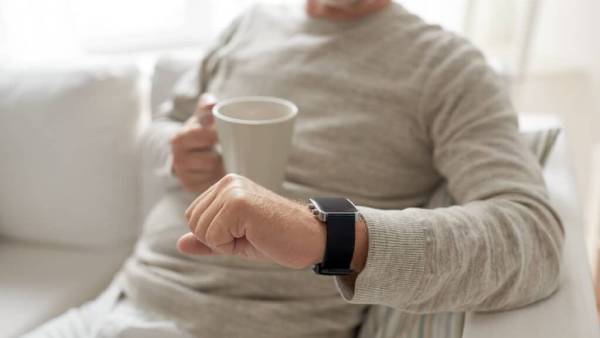
Types of Medical Alert Systems
In-Home Systems
In-home systems are the traditional type of medical alert systems. They consist of a base unit that is connected to a phone line or a cellular service, and a wearable emergency button. The base unit is usually placed in a central location in the home, such as the living room or kitchen. When the emergency button is pressed, the base unit dials the monitoring center for assistance.
These systems are ideal for individuals who spend most of their time at home. However, they do have a range limit, meaning the wearable device must be within a certain distance of the base unit to function.
Mobile Systems
Mobile systems are a type of medical alert system that operate on a cellular network. They consist of a portable base unit and a wearable emergency button. The portable base unit can be taken anywhere, and when the emergency button is pressed, it uses cellular connectivity to dial the monitoring center.
These systems are ideal for active individuals who often leave their homes. They offer protection both at home and on the go, as long as there is cellular service.
On the Go Systems
On the go systems are similar to mobile systems, but they are designed to be even more portable. The emergency button and the cellular communicator are often combined into a single wearable device. This device can be taken anywhere and can dial the monitoring center directly when the emergency button is pressed.
These systems are perfect for individuals who travel frequently or lead active lifestyles. They provide protection no matter where the user is, as long as there is cellular service.
Comprehensive Systems
Comprehensive systems combine the features of in-home systems and mobile systems. They include a base unit for home use, a mobile device for use outside the home, and a wearable emergency button.
These systems offer the most protection, as they cover the user both at home and on the go. They are ideal for individuals who want the security of an in-home system and the flexibility of a mobile system.
Comparison of Different Types of Systems
Each type of medical alert system has its advantages and is suited to different lifestyles and needs.
- In-home systems are ideal for individuals who spend most of their time at home and want a simple, straightforward system.
- Mobile systems offer more flexibility and are suited to active individuals who often leave their homes.
- On the go systems are the most portable option and are perfect for frequent travelers or those who lead very active lifestyles.
- Comprehensive systems offer the most protection and are ideal for those who want coverage both at home and on the go.
When choosing a medical alert system, it’s important to consider your lifestyle, needs, and the features that are most important to you.
Features of a Good Medical Alert System
Automatic Fall Detection
Automatic fall detection is a crucial feature in many medical alert systems. This technology is designed to automatically detect if the user has fallen and send an alert to the monitoring center. It works by using sensors in the wearable device to detect sudden changes in motion and orientation.
This feature is particularly useful for individuals who are at risk of falling and may not be able to press the emergency button after a fall. However, it’s important to note that no fall detection system is 100% accurate, and false alarms can occur.
Emergency Button
The emergency button is the heart of any medical alert system. It’s a button that the user can press in case of an emergency to alert the monitoring center. The button is usually located on a wearable device, such as a pendant or wristband, but can also be found on the base unit of an in-home system.
When pressed, the emergency button sends a signal to the monitoring center, which then initiates a two-way communication with the user to assess the situation and provide assistance.
Location Tracking
Location tracking is a feature found in many mobile medical alert systems. It uses GPS technology to track the location of the user, which can be crucial in an emergency situation, especially if the user is unable to communicate their location.
This feature is particularly useful for individuals who often leave their homes, as it allows the monitoring center and emergency services to locate them quickly in case of an emergency.
Medication Reminders
Medication reminders are a feature that some medical alert systems offer. This feature allows users to set reminders for when they need to take their medication, which can be particularly useful for individuals who take multiple medications at different times of the day.
When it’s time to take a medication, the system will alert the user with an audible or visual reminder. This can help ensure that medications are taken correctly and on time, which can be crucial for managing health conditions.
Battery Life
Battery life is a crucial factor to consider when choosing a medical alert system. The battery life of the wearable device and the base unit can affect the system’s reliability and the user’s safety.
Most medical alert systems have a battery backup for the base unit in case of a power outage, and the wearable devices usually have long-lasting batteries. Some systems even send an alert to the monitoring center when the batteries are low, ensuring that the system is always ready to use.

How Do Medical Alert Systems Work Without Landline?
Medical alert systems without landline work by using cellular service to connect the user to the monitoring center. When the emergency button on the medical alert device is pressed, a signal is sent via the cellular network to the monitoring center.
What are the TOP Medical Alert System Providers Without Landline in 2024?
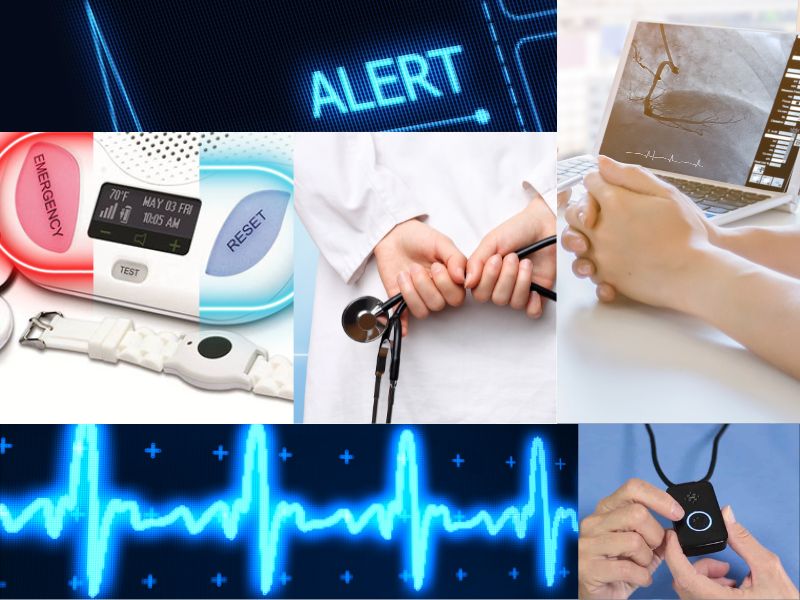
Reviews: Top 11 Medical Alert System Providers Without Landline in 2024
1. Bay Alarm Medical
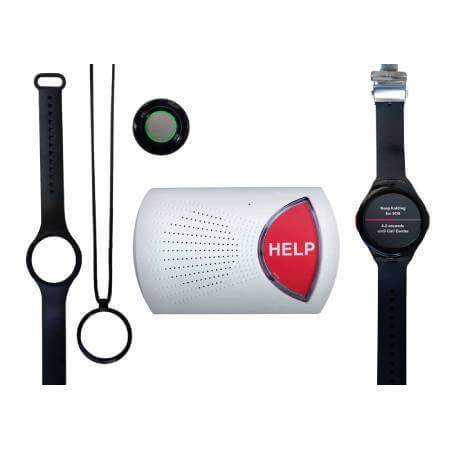
Bay Alarm Medical
Our Rating:

5.0
Bay Alarm Medical is a reliable provider of medical alert systems, offering a balance of affordability and quality service. Their In-Home Medical Alert system is a simple yet effective solution that connects users to a 24/7 emergency response center at the press of a button. The system is easy to install and provides quick response times.
However, it lacks some of the advanced features found in more expensive systems, such as medication reminders and environmental sensors. The system is available with an optional fall detection pendant and wireless wall buttons for added convenience and safety.
Pros of Bay Alarm Medical:
Cons of Bay Alarm Medical:
2. Medical Guardian
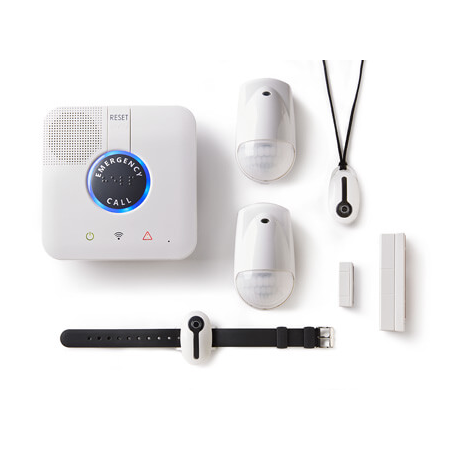
Medical Guardian
Our Rating:

4.7
Medical Guardian offers a range of medical alert systems, including the MGMove Smartwatch. This device is not only a stylish accessory but also a comprehensive medical alert system. It includes a built-in heart rate monitor and pedometer, and it provides medication, appointment, and prescription refill reminders.
The smartwatch also allows for GPS and Wi-Fi tracking, making it an excellent choice for active seniors. However, it does not offer fall detection.
Pros of Medical Guardian:
Cons of Medical Guardian:
3. Life Alert Systems
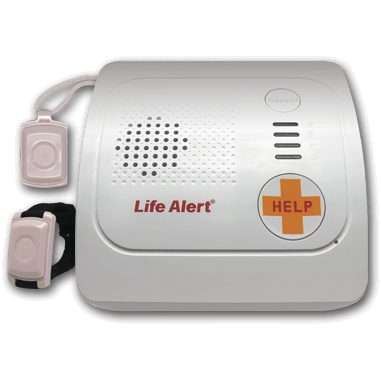
Life Alert Systems
Our Rating:

4.6
Life Alert Systems is known for its quick response times and reliable service. Their In-Home No Landline Medical Alert System is particularly notable for its long-range wearable help button, which has a range of up to 600 feet. This makes it particularly useful for individuals who frequently spend time in their garden or yard.
The system lacks some features like a mobile app or caregiver tools, but its quick response time makes it one of the fastest systems for getting help.
Pros of Life Alert Systems:
Cons of Life Alert Systems:
4. WellBe Medical Alert Plus
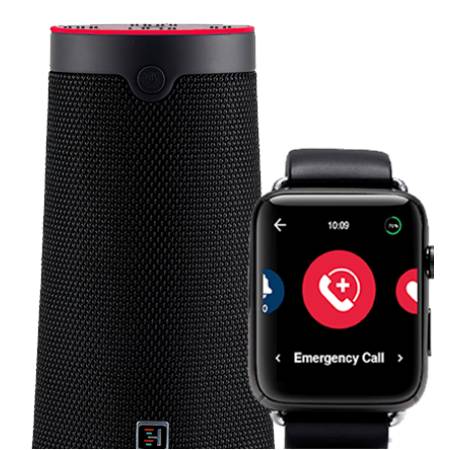
WellBe Medical Alert Plus
Our Rating:

4.7
WellBe Medical Alert Plus is a feature-rich medical alert system that includes a smartwatch with an emergency call button and a smart speaker. The system provides medication, appointment, and prescription refill reminders.
It also offers quick response times when help is needed. The smartwatch includes a built-in heart rate monitor and pedometer, and it allows caregivers and family members to track the user’s location via GPS and Wi-Fi.
Pros of WellBe Medical Alert Plus:
Cons of WellBe Medical Alert Plus:
5. Aloe Care Health
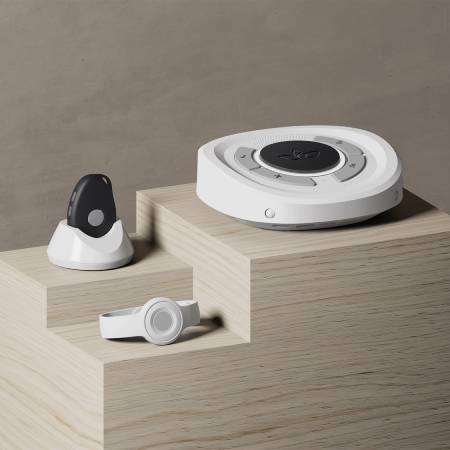
Aloe Care Health
Our Rating:

4.6
Aloe Care Health offers an in-home system that includes a smart hub with an emergency call button and a call button pendant. The hub monitors air quality, motion, and room temperature, and it enables hands-free communication with family members and caregivers. The system is easy to set up and offers relatively quick response times.
Pros of Aloe Care Health:
Cons of Aloe Care Health:
6. Lively Mobile Plus
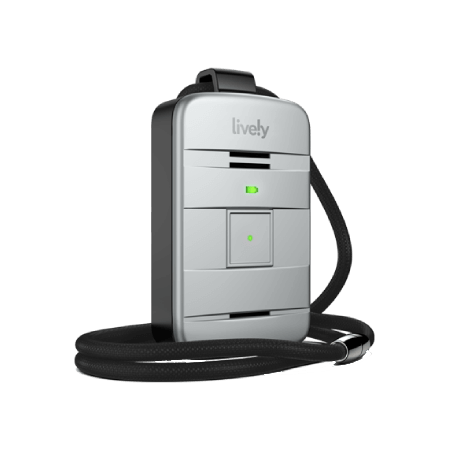
Lively Mobile Plus
Our Rating:

4.6
Lively Mobile Plus is a mobile medical alert device known for its fast response times. It offers clean two-way audio and accurately pinpoints the user’s location when they’re on the move.
The device also offers optional fall detection and 24/7 access to doctors and nurses for medical advice and prescription refills.
Pros of Lively Mobile Plus:
Cons of Lively Mobile Plus:
7. LifeFone At-Home and On-the-Go GPS Voice-in-Necklace
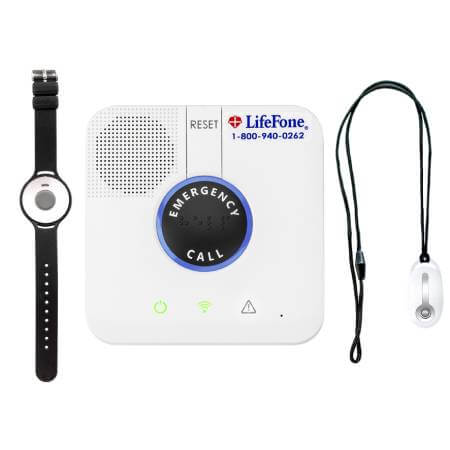
LifeFone At-Home and On-the-Go GPS Voice-in-Necklace
Our Rating:

4.6
LifeFone‘s At-Home and On-the-Go GPS Voice-in-Necklace offers a long battery life of up to 30 days between charges. It uses Wi-Fi, cellular, and GPS radios to pinpoint the user’s exact location and offers excellent caregiver options, including medicine reminders and location tracking on a map.
Pros of LifeFone At-Home and On-the-Go GPS Voice-in-Necklace:
Cons of LifeFone At-Home and On-the-Go GPS Voice-in-Necklace:
8. MobileHelp Classic
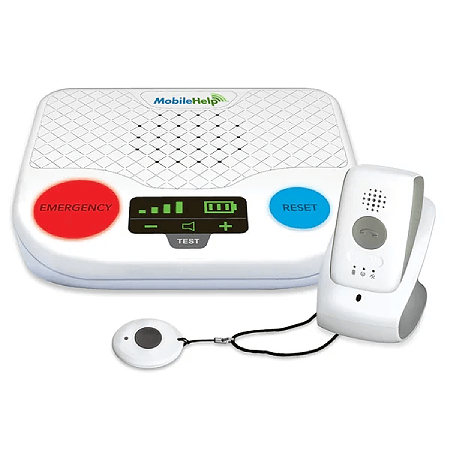
MobileHelp Classic
Our Rating:

4.6
MobileHelp Classic is an affordable medical alert system that offers several advanced features, including a wearable call button pendant, cellular connectivity, and a backup battery that provides up to 30 hours of power. The system is easy to install and provides quick response times.
Pros of MobileHelp Classic:
Cons of MobileHelp Classic:
9. Philips Lifeline GoSafe 2

Philips Lifeline GoSafe 2
Our Rating:

4.6
Philips Lifeline GoSafe 2 is a mobile medical alert device that uses GPS, Wi-Fi, and audio beaconing to help responders find the user. The device offers automatic fall detection and a help button that connects the user to a response center. It also includes a rechargeable battery that lasts up to three days on a single charge.
Pros of Philips Lifeline GoSafe 2:
Cons of Philips Lifeline GoSafe 2:
10. ADT Medical Alert
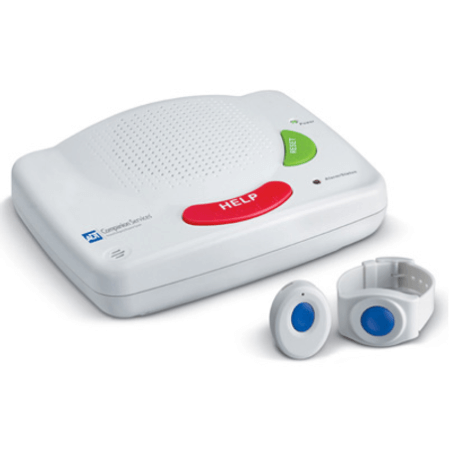
ADT Medical Alert
Our Rating:

4.6
ADT Medical Alert offers a range of medical alert systems, including the On-the-Go Emergency Response System. This system includes a lightweight, waterproof pendant with a help button that connects the user to a response center.
It also includes GPS location tracking and optional fall detection. The system is easy to install and offers relatively quick response times.
Pros of ADT Medical Alert:
Cons of ADT Medical Alert:
11. Connect America Medical Alert

Connect America Medical Alert
Our Rating:

4.6
Connect America Medical Alert offers a range of medical alert systems, including the Mobile LTE Medical Alert System. This system includes a lightweight, waterproof pendant with a help button that connects the user to a response center.
It also includes GPS location tracking and optional fall detection. The system is easy to install and offers relatively quick response times.
Pros of Connect America Medical Alert:
Cons of Connect America Medical Alert:
Comparison of Different Providers
When comparing different providers, it’s important to consider factors such as the range of the system, the features it offers, the response time of the monitoring center, and the cost. Some providers offer additional features such as medication reminders, caregiver tools, and location tracking, while others focus on providing a simple, reliable service at an affordable price. It’s also important to consider the reputation of the provider and the quality of their customer service.
Costs and Pricing Structures
1. Monthly Fees
Monthly fees for medical alert systems can vary significantly depending on the features and services provided by the medical alert company. These fees typically cover the cost of 24/7 monitoring services and access to emergency services. Some companies may offer different pricing tiers based on the level of service provided.
For example, a basic plan might include a simple home medical alert system with a wearable device and 24/7 monitoring, while a more expensive plan might include mobile devices, automatic fall detection, and other advanced features.
2. Equipment Fees
In addition to monthly fees, some medical alert system companies may also charge equipment fees. These fees cover the cost of the medical alert devices themselves, such as the home medical alert system, mobile system, wearable device, and any additional equipment like fall detection devices or cellular connectivity devices. Some companies may include the cost of the equipment in the monthly fee, while others may charge a one-time upfront equipment fee.
3. Activation Fees
Some medical alert system providers may charge an activation fee when you first sign up for their service. This fee covers the cost of setting up the medical alert system and activating the monitoring service. However, not all companies charge an activation fee, and some may waive the fee as part of a promotional offer.
4. Price Lock Guarantee
A price lock guarantee is a promise from the medical alert company that your monthly fees will not increase over time. This can provide peace of mind and make it easier to budget for the cost of the medical alert system.
However, not all companies offer a price lock guarantee, so it’s important to ask about this when comparing different medical alert system options.
5. Tips for Choosing the Right Medical Alert System
When choosing a medical alert system, it’s important to consider both the upfront costs and the ongoing monthly fees. Be sure to ask about any additional fees, such as activation fees or equipment fees, as these can add to the overall cost of the system. Look for a medical alert system provider that offers a price lock guarantee to ensure that your monthly fees won’t increase over time.
Finally, consider the features and services that are most important to you, such as automatic fall detection, location tracking, or medication reminders, and make sure that these are included in the cost of the system.
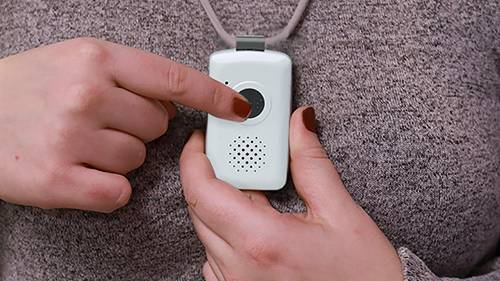
User Experience and Reviews
Medical Alert System Users’ Experience
Medical alert systems are designed to provide peace of mind and enhance the safety of their users. They are particularly beneficial for individuals living alone, those prone to falls, or those with mobility issues. The user experience with these systems is generally positive, with many users reporting that they feel safer and more confident living independently.
- Medical alert systems provide a sense of security, knowing that help is just a button press away.
- Users appreciate the 24/7 monitoring provided by monitoring centers, which ensures that help can be summoned at any time.
- The emergency button on the devices is typically easy to use, even for those who are not tech-savvy.
- Users of mobile medical alert systems appreciate the freedom and security these systems provide, allowing them to continue their active lifestyles with peace of mind.
- Many users report that the customer service representatives of these companies are helpful and responsive, further enhancing their experience with the systems.
Reviews from Medical Alert System Companies
Reviews from users of medical alert systems are generally positive, with many praising the reliability and ease of use of these systems. Here are some common points highlighted in reviews:
- Users appreciate the automatic fall detection feature, which can call for help even if the user is unable to press the emergency button.
- The location tracking feature in mobile systems is highly praised, especially by users with Alzheimer’s disease or other memory issues.
- Users appreciate the medication reminders provided by some systems, which help ensure they don’t forget to take their important medications.
- The battery life of the devices is often mentioned in reviews, with users appreciating devices that don’t need to be charged frequently.
Importance of Customer Service in Medical Alert Companies
Customer service plays a crucial role in the user experience with medical alert systems. From helping users set up their systems to answering questions and addressing concerns, the customer service team is a vital part of any medical alert company.
- Customer service representatives are often the first point of contact for users and their families, providing guidance and support.
- Good customer service can enhance the user’s confidence in the system and the company, knowing that help and support are readily available.
- The role of the monitoring center operator is also crucial, as they are the ones who respond to alerts and coordinate emergency services if needed.
Role of Monitoring Center Operator
The monitoring center operator plays a critical role in a medical alert system. They are the ones who respond when the emergency button is pressed or when an automatic alert is triggered.
- The operator’s role is to assess the situation and provide the necessary assistance, whether that’s calling for emergency services or contacting a caregiver or family member.
- The operator’s response can make a significant difference in the outcome of an emergency situation, making their role crucial in the system.
How to Choose a Medical Alert Provider
Choosing the right medical alert provider involves considering several factors, including the features of the system, the cost, and the reputation of the company. Here are some tips:
- Consider your needs: Do you need a system with automatic fall detection? Do you prefer a mobile system or an in-home system?
- Consider the costs: Be sure to consider all costs, including monthly fees, equipment fees, and activation fees. Some companies offer a price lock guarantee to ensure the cost stays affordable.
- Read reviews: User reviews can provide valuable insights into the reliability of the system and the quality of customer service.
- Consider the reputation of the company: Look for companies with a good reputation for reliable systems and excellent customer service.
FAQs on Medical Alert Systems Without Landline
What is the Best Medical Alert System Without Landline?
The medical alert system without landline can vary depending on individual needs and preferences. However, some of the top-rated systems include those from Bay Alarm Medical, Medical Guardian, and Life Alert Systems. These companies offer reliable medical alert systems that provide a range of features, such as automatic fall detection, location tracking, and emergency buttons. It’s important to consider factors such as cost, features, and customer reviews when choosing the best system for you.
How Do Medical Alert Systems Work Without Landline?
Medical alert systems without landline work by using cellular service to connect the user to the monitoring center. When the emergency button on the medical alert device is pressed, a signal is sent via the cellular network to the monitoring center. The monitoring center operator then communicates with the user through the device’s speaker and microphone to assess the situation and provide assistance. Some systems also offer automatic fall detection, which can automatically send an alert to the monitoring center if a fall is detected.
What are the Costs Involved in a Medical Alert System Without Landline?
The costs of a medical alert system without landline can vary depending on the provider and the features of the system. Costs typically include monthly fees for the monitoring service, equipment fees for the medical alert devices, and potentially activation fees for setting up the system. Some providers may offer a price lock guarantee, which ensures that your monthly fees will not increase over time. It’s important to ask about all potential costs when considering different systems.
What Features Should I Look for in a Medical Alert System Without Landline?
When choosing a medical alert system without landline, you should consider features that meet your specific needs. Some important features to consider include:
Automatic fall detection: This can automatically send an alert if a fall is detected, which can be particularly useful for individuals at risk of falling.
Emergency button: This allows the user to easily call for help in an emergency.
Location tracking: This can help locate the user in an emergency, particularly for mobile medical alert systems.
Battery life: A long battery life ensures that the system is always ready to use.
Price lock guarantee: This ensures that your monthly fees will not increase over time.
Are There Any Free Medical Alert Systems Available?
While there are some programs and organizations that may offer free or low-cost medical alert systems to qualifying individuals, most medical alert systems require a monthly fee. The cost can vary depending on the provider and the features of the system. It’s important to consider the cost and value of the system when choosing a medical alert provider.
What is a Personal Emergency Response System?
A personal emergency response system is a type of medical alert system that allows users to call for help in an emergency with the press of a button. These systems typically include a wearable device, such as a pendant or wristband, and a base unit that connects to a monitoring center. When the button on the wearable device is pressed, the user is connected to a customer service representative at the monitoring center who can assess the situation and dispatch emergency services if needed.
How Does a Cellular System Work in a Medical Alert System?
A cellular system in a medical alert system uses cellular networks to connect the medical alert device to the monitoring center. This means that the system can operate without a landline phone connection, making it a good option for those who don’t have a landline or who want a system that can work both at home and on the go.
What is the Role of a Customer Service Representative in a Medical Alert System?
A customer service representative in a medical alert system is a trained professional who responds when the emergency button on the medical alert device is pressed. They communicate with the user to assess the situation and can call for emergency services or contact a caregiver or family member as needed.
What is a Caregiver App in a Medical Alert System?
A caregiver app is a feature offered by some medical alert systems that allows caregivers or family members to monitor the user’s status and receive alerts. This can provide peace of mind for caregivers and help ensure the user’s safety.
How Much Does a Medical Alert System Cost Per Month?
The cost of a medical alert system per month can vary depending on the provider and the features of the system. Costs typically include a monthly fee for the monitoring service, and may also include equipment fees or activation fees. It’s important to ask about all potential costs when considering different systems.
What is a Room Temperature Sensor in a Medical Alert System?
A room temperature sensor is a feature offered by some medical alert systems that monitors the temperature in the user’s home. This can provide an extra layer of safety, particularly for users who may be at risk of health issues related to extreme temperatures.
Conclusion
Recap of the Best Medical Alert Systems Without Landline
In this comprehensive guide, we’ve delved deep into the realm of medical alert systems without landline, providing a detailed overview of their functionality, benefits, and the key factors to consider when choosing the right system for your needs.
We’ve highlighted some of the industry’s leading providers, each offering unique features and services that cater to a variety of needs and preferences. These providers have been carefully selected based on their reputation, the quality of their systems, and their commitment to customer satisfaction.
Bay Alarm Medical is a renowned provider in the industry, known for its reliable and user-friendly systems. They offer a range of medical alert systems, each designed with the user’s safety and convenience in mind. Their systems are equipped with features such as automatic fall detection, which can automatically send an alert to the monitoring center if a fall is detected. This can be particularly beneficial for individuals who are at risk of falls, providing an added layer of protection and peace of mind.
In addition to their advanced features, Bay Alarm Medical is also known for its transparent pricing. They provide clear information about their monthly fees and equipment fees, allowing users to make an informed decision without any hidden costs. This commitment to transparency and affordability has made Bay Alarm Medical a popular choice among many users.
Medical Guardian is another top-rated provider, known for its innovative approach to medical alert systems. They offer a range of devices, each equipped with advanced features to provide comprehensive coverage and peace of mind. Their systems are designed to be as unobtrusive as possible, allowing users to maintain their independence while ensuring help is readily available when needed.
Medical Guardian’s systems also include automatic fall detection, providing an extra layer of safety for users. In addition to this, their systems are designed to be easy to use, with simple, intuitive controls and a user-friendly interface. This focus on user experience, combined with their advanced features and reliable service, has made Medical Guardian a trusted name in the industry.
Life Alert is a well-established name in the industry, with a long history of providing reliable and efficient services. Their systems are designed to provide immediate assistance in the event of an emergency, with a focus on ease of use and quick response times. Life Alert offers a range of devices, including in-home systems and mobile devices, ensuring that users have access to help wherever they are.
One of the standout features of Life Alert is their 24/7 monitoring service. Their monitoring centers are staffed by trained professionals who are ready to respond at a moment’s notice, providing reassurance for users and their loved ones. This commitment to providing round-the-clock support has made Life Alert a trusted choice for many users.
When considering the cost of these systems, it’s important to factor in both the monthly monitoring fees and any potential equipment fees. These fees can vary depending on the provider and the specific features of the system. It’s important to ask about all potential costs upfront to ensure there are no surprises down the line.
The “best” medical alert system will depend on your specific needs, preferences, and budget. Whether you’re looking for a simple, straightforward system, or a more advanced system with a range of features, there’s a medical alert system out there that’s right for you. By understanding the features and costs associated with these systems, you can make an informed decision and choose the best system for your needs.
Final Thoughts and Recommendations
Choosing the right medical alert system is a personal decision that should be based on your specific needs and circumstances. Whether you’re looking for a mobile medical alert system for on-the-go safety, or an at home landline system for added security at home, there are numerous available medical alert systems to choose from.
Consider the features that are most important to you. For instance, cellular medical alert systems offer the advantage of not needing a landline system and can provide coverage wherever there’s a cell phone connection. Some systems, like those offered by Bay Alarm Medical’s, even come with caregiver apps that allow loved ones to monitor the user’s status and receive alerts in the event of a medical emergency.
If you’re frequently on the move, an on the go system might be the best fit for you. These systems often come with on the go devices that can be easily carried around, providing peace of mind wherever you are.
When considering costs, remember to factor in both upfront costs and ongoing monthly fees. Most medical alert companies provide detailed pricing information on their websites, such as Bay Alarm Medical’s website and Medical Guardian’s website.
Also, consider the quality of the emergency monitoring center and the responsiveness of the customer service representatives. In an emergency, these are the people you’ll be interacting with, so it’s important that they’re reliable and efficient.
Lastly, don’t overlook the additional features that some systems offer. For instance, a comprehensive system might include room temperature sensors and air quality sensors to monitor the user’s environment, providing an extra layer of safety.
In conclusion, medical alert systems without landline offer a valuable service, providing peace of mind and increased safety for users and their loved ones. By understanding the features and costs associated with these systems, you can make an informed decision and choose the best system for your needs.
